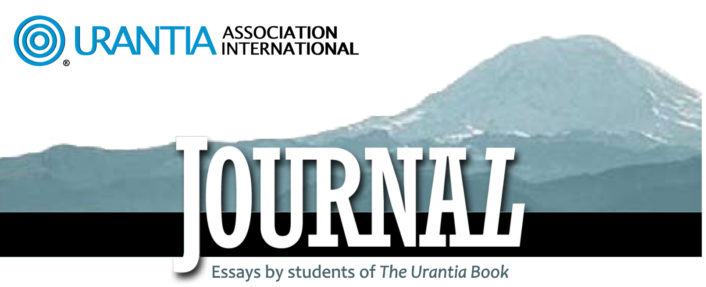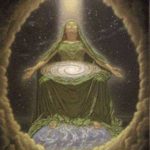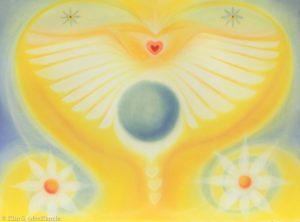© 2022 Mark Blackham, Elisabeth Callahan, Kurt Cira, André Desjardins, Peter Walker
© 2022 International Urantia Association (IUA)


¶ In This Issue
- Editor’s Note – November 2022 – Mark Blackham
- Our Missing Mother God – Monotheism at the Cost of Trinitarianism – Elisabeth Callahan, USA
- My Relationship to God – My Mother and Father – Kurt Cira, USA
- The Psychic Circles and Morontia Life – André Desjardins, Canada
- The Word, the Language, the Dictionary – Peter Walker, USA
- About the Journal
¶ Editor’s Note – November 2022
Mark Blackham

Welcome to the November 2022 edition of the Urantia Association’s Journal, a publication dedicated to the thoughts, observations, and experiences of Urantia Book students from around the world. Our contributors explore a wide range of topics, including personal stories of spiritual discovery, finding new meanings and values, and enhancing spiritual perception. Others write about cosmology, science, and ways to improve global civilization. Throughout all these articles, we see an extraordinary diversity of thought coupled with a spirited unity of purpose.
Our first article, Our Missing Mother God: Monotheism at the Cost of Trinitarianism by Elisabeth Callahan, is an insightful and novel essay centered on the Mother concept of God. Elisabeth has conducted several classes and forums at the Urantia University Institute on the nature of the local universe Mother Spirit as well the maternal characteristics of the Eternal Son and God the Supreme. In this essay, she makes the case that the continued focus on a male dominated monotheism in world religions detracts from the higher truth inherent in the nature of trinitarianism and, in the process, has devalued the maternal creative function.
¶ Our Missing Mother God – Monotheism at the Cost of Trinitarianism
Elisabeth Callahan, USA

Back in the late 1980s, while engaged in a graduate program in transpersonal psychology, I took a class in Creation Spirituality with Matthew Fox, the former Dominican priest, theologian, and author of 37 books including Creation Spirituality: Liberating Gifts for the Peoples of the Earth. This was my first significant foray into the idea that God has a pervasive, life-giving, maternal creative function.
At the time, from the viewpoint of the magisterium of the Roman Catholic Church, Fox’s perspective bordered on heresy. He was booted from the Dominican priesthood but later, in 1994, he was received as a priest in the Episcopal Church by Bishop William Swing.
Nonetheless, the concept of creation spirituality was planted in my mind as something worth pondering. Creation spirituality posits that God is in all things (panentheism), that divinity permeates all things, and that all things bear the energetic blueprint of divinity. That is not to say that God is all things, which is a pantheistic assertion, although it is true to say that without God or a Primal Cause, nothing would exist.
¶ My Relationship to God – My Mother and Father
Kurt Cira, USA

My understanding of, and relationship with, God has changed tremendously since I discovered The Urantia Book fifty years ago. I was raised in a religion where masculine, anthropomorphic descriptions of Deity dominated the religious thinking of our world. This is not surprising given that almost all aspects of society have been male dominated except within the home, where women have often played an equal or dominant role in family life. The Judeo-Christian and Islamic theologies that are the prevailing religious systems of our times are a product of, and are rooted in, concepts of God that place little emphasis on God as Mother as well as Father. Even the Urantia Papers are written in a way that makes far more use of the term Father and masculine pronouns to describe God. This preponderance of usage has led me and many who have studied the book to overlook its ground-breaking revelation of God as equally mother-like and in possession of all the traits and values that we associate with the feminine.
¶ The Psychic Circles and Morontia Life
André Desjardins, Canada

An archangel of Nebadon mentions:
You should understand that the morontia life of an ascending mortal is really initiated on the inhabited worlds at the conception of the soul, at that moment when the creature mind of moral status is indwelt by the spirit Adjuster. [UB 48:6.2]
This quotation indicates that morontial life begins on our planet at the formation of the soul through a sincere moral choice, heralding the arrival of the indwelling Thought Adjuster. The joint formation of the morontial soul with the Adjuster provides access to morontia realities, and it is possible for a human personality to know and experience a taste of morontia life during his or her earthly life with the absolute conviction of being part of this great morontial family.
The Urantia Book gives us some information about the activities in the schools of education and training on the morontia worlds in Papers 47 and 48. These papers give us an opportunity to study and join these morontia schools during our earthly life. Man has the power to transcend time and space and live as if in direct contact with the Heavenly Father through his vast personality circuit and through the indwelling presence of the Thought Adjuster. “Man’s ability to transcend himself is the one thing which distinguishes him from the animal kingdom” [UB 111:6.9].
¶ The Word, the Language, the Dictionary
Peter Walker, USA

In the Spring of 2018, I read of the new library in the Urantia Foundation’s building, dedicated to containing the works of literature assumed to have been used by the revelators in the Urantia Papers’ formation. Over the years, I have wondered about the origins of the Urantia Papers and reviewed such websites as Matthew Block’s Square Circles in his efforts to match The Urantia Book to human sources. The new library at the Urantia Foundation preserving such works is an invaluable collection, especially for future generations.
Having studied The Urantia Book for years, I am still amazed at the quality of the English language used in the papers. The Urantia Book is a masterpiece of prose literature with its poetic cadence, with each author representing their thoughts through the written word. The style of the Urantia Papers is exclusive from any human author’s works I have read. Even the style of each author is unique. Each has its unique writing style, from a Divine Counselor to a Solitary Messenger, Mighty Messenger, or the Midwayer Commission.
¶ About the Journal

The Journal is produced twice yearly and contains essays, articles and study aids by readers and for readers of The Urantia Book. Any interpretations, opinions, conclusions, or artistic representations, whether stated or implied, are those of the authors and do not necessarily represent the views and opinions of Urantia Association International, the National or Local Urantia Associations, or the editorial team of the Association’s Journal.
You can view the entire collection of issues in the archives. All issues before 2017 are downloadable PDF format.
The Journal is currently published in English, French and Spanish. (There are some older issues that were published in Finnish.) You can view the French and Spanish Journals by clicking on the language choices in the pull down menu at the top of the page.
- Subscriptions
- Journal Team
- Submission Policy
- Citation Guidelines